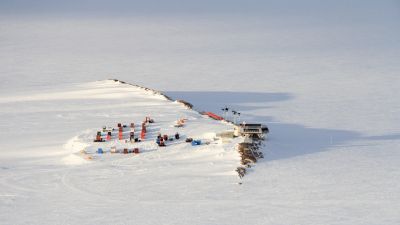
Last Stage to the First Zero Emission Research Station
On October 16th, 2008, the International Polar Foundation (IPF) will reveal the technical systems that will make the Princess Elisabeth station the very first "zero emission" research station ever constructed in Antarctica. An international press conference will be held at 11 am at the Laborelec (Electrabel) premises in Brussels.
The completion of the first phase of construction during BELARE (Belgian Antarctic Research Expedition) 2007-08 was a major accomplishment, and a dream come true for Alain Hubert, Founding President of the IPF and Director of the Princess Elisabeth station project, as for every member of the team.
During the 2008 austral winter, the Princess Elisabeth station was left in hibernation; the same cannot be said of the BELARE team working from Brussels. From June to October 2008, a team of dedicated experts have been busy building and testing the energy management systems designed to make Princess Elisabeth Antarctica the very first "zero emission" research base. Inside a scaled mock-up of the station's technical core at Laborelec, Belgium, the core systems of the station were pre-assembled:
- firstly to check the installation of the systems inside the confined space;
- secondly, to provide a trial run for the construction crew and engineers from Schneider Electric and Electrabel, GDF SUEZ Group, who will later take care of re-assembling the systems in Antarctica; and
- thirdly, to measure the equipment energy loads and to test the energy management protocols.
Once tried and tested, the systems will be shipped to Antarctica via Antwerp in mid-November onboard the ice-class cargo ship MSCO Ivan Papanin. These sophisticated electronic systems will reach their final destination at Utsteinen, in Antarctica's Dronning Maud Land, around Christmas time.
From November 2008 to March 2009, the final phase of the Princess Elisabeth's construction will take place during this year's BELARE 2008-09 Expedition. During the expedition, all the functional systems of the station tested in Brussels (energy management, ventilation and waste water treatment) will be installed. The official inauguration of the station in Antarctica is planned for mid-February 2009, thus making the Princess Elisabeth station the only station to be completed within the International Polar Year 2007-09. Even before the systems are fully integrated, several international research expeditions will use the Princess Elisabeth station as a base camp.
- In November and December 2008, a team of glaciologists lead by the Université Libre de Bruxelles (ULB) and comprised of scientists from the University of Aberystwyth and the University of Washington will study the mass loss/gain of the Antarctic ice sheet in light of recent climate change.
- In January and February 2009, microbiologists from the Université de Liège (ULg) and the Universiteit Gent (UGent) will explore the diversity of microorganisms in the Sør Rondane area with scientists from the Museum of Paris and the British Antarctic Survey.
- In January 2009, the Belgian Royal Meteorological Institute (IRM) will start collecting data around the station with an international team of scientists inluding a Russian and German.
- During this same period, geoscientists from the Japanese National Institute of Polar Research (NIPR) will conduct geological research around Utsteinen.
The Princess Elisabeth project has been in the making for five years and has included contributions from countless dedicated individuals and corporations. The originality of the project, which was conceived, designed and financed by the IPF through sponsorship, opens up new possibilities for the international community, and raises new standards for polar research. Beyond the financial sponsors and technical partners involved in constructing the station, further support was provided on the scientific level by the Inbev-Baillet Latour Fund.
Using specialised building design and materials, a passive heating system, an energy control system, energy efficient appliances, and sound insulation techniques, engineers from the IPF and its technical partners have managed to take a pioneering step forward in the domain of sustainable development. The station is also unique in that it is a joint public-private venture, carried out by the IPF and the Belgian federal Science Policy Office (Belspo).
Aside from its scientific mission, the Princess Elisabeth station will be the main theme for an educational program coordinated by the IPF. "Class Zero Emission" will be launched this January 2009 in classrooms across Belgium. The initiative offers workshops about climate change through the station's "zero emission" objectives and polar science programs
